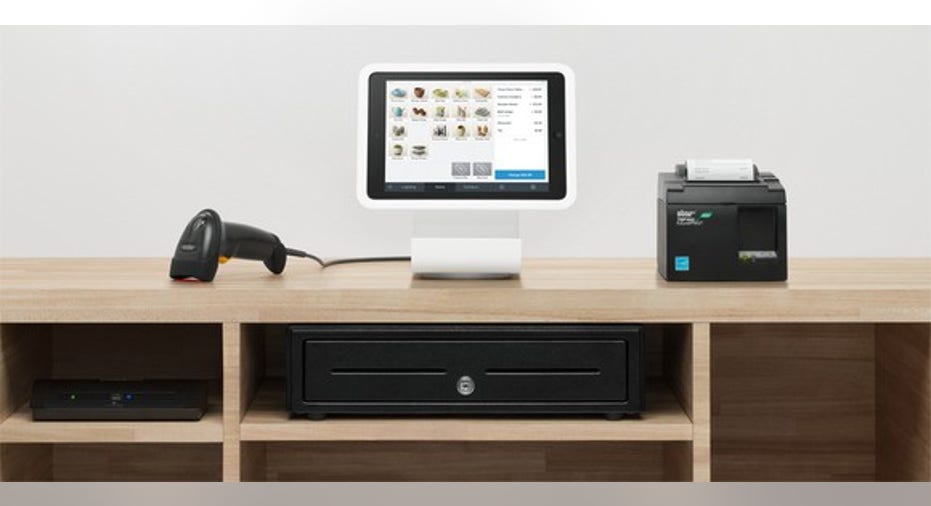How Risky Is Square Inc?

Image source: Square.
Square's (NYSE: SQ) business is booming, but its share price performance has been lousy since it entered the public markets last November. Year-to-date, shares of Square have lost about 8% of their value, under-performing the broader market.
At these levels, Square may offer more adventurous investors some upside, but the company is not without its risks. Let's take a closer look at some of the risk factors Square shareholders should be mindful of.
Competition in the payment space is heating up
Square's business centers around facilitating payments between small business owners and their customers. Before Square, there was no easy or inexpensive way for small businesses to accept credit card payments. Today, small business owners can take advantage of Square's readers, accepting plastic payments for a modest, flat fee. Last quarter, Square's merchant partners sold a total of $12.5 billion worth of goods and services using its readers, up 42% on an annual basis.
The entire edifice of Square's business is built on this simple concept, and if it's threatened, Square could be in trouble.
Square faces a variety of competitors, including similar providers and sellers of more traditional credit card terminals. The most threatening competition, however, many come from mobile wallets and other methods of paying digitally.
PayPal's Venmo has emerged as a popular service with consumers, and is commonly used among friends and roommates to send money digitally. To date, Venmo has done little to enter the business space, but is planning an expansion. It's currently testing Venmo payments with select merchant partners.
Whether it's PayPal or some other company, Square's business could be jeopardized by small business flocking to a different method of payment.
Square remains dependent on other companies' hardware
For the most part, Square's credit card readers are not stand-alone devices -- rather, they require the use of companion mobile devices, including smartphones and tablets, to function. In a common scenario, a small business owner may use their personal smartphone and a Square reader to accept a credit card payment.
The demand for smartphones and tablets doesn't seem likely to go anyway anytime soon. Nevertheless, Square's dependency leaves it slightly exposed and vulnerable.
Some smartphone manufacturers have begun to ditch the traditional, 3.5mm headphone port. Although Square sells a wireless credit card reader for around $49, its entry-level reader continues to make use of the port, attaching to a smartphone or tablet through its headphone jack.
Services could struggle
The core of Square's business may center around payments, but its biggest opportunities may lie with its services.
Square offers a collection of ancillary services to its merchant partners, including Square Capital (loans), Caviar (food delivery), and Instant Deposit (direct bank deposit). These services offer the potential for much greater margins than Square's core business, while keeping merchants loyal.
Fortunately for Square shareholders, demand for these services has been strong in recent months. Last quarter, Square's software and data product revenue rose 130% on an annual basis.
But unfortunately, all of Square's services remain in their infancy. Even with that rapid growth, service revenue generated less than one-fifth of Square's adjusted revenue last quarter. It's not clear how successful Square's services could ultimately be, or if there's truly a market for them. Some of them, particularly Square Capital, have enjoyed tremendous success, but others could ultimately be shuttered.
Strongly leveraged to the economy
In times of economic turbulence, few companies perform well. Yet Square could be particularly susceptible to economic downturns.
Its merchant partners pay it a flat fee of each transaction (around 2.9% on average). During an economic recession, the number of goods sold is likely to fall, as is the price of those goods. At the same time, many small businesses could fold, and the demand for Square's ancillary services could dry up. Investors' willingness to finance Square Capital could likewise be affected.
Square was founded during the depths of the great recession, in Feb. 2009. That makes it a relatively young company, and to date, its business model hasn't had to deal with a protracted period of economic calamity. It's hard to predict when the next recession will take place, but it's an inevitability, and when it happens, Square could suffer to a tremendous degree.
A secret billion-dollar stock opportunity The world's biggest tech company forgot to show you something, but a few Wall Street analysts and the Fool didn't miss a beat: There's a small company that's powering their brand-new gadgets and the coming revolution in technology. And we think its stock price has nearly unlimited room to run for early in-the-know investors! To be one of them, just click here.
Sam Mattera has no position in any stocks mentioned. The Motley Fool owns shares of and recommends PayPal Holdings. Try any of our Foolish newsletter services free for 30 days. We Fools may not all hold the same opinions, but we all believe that considering a diverse range of insights makes us better investors. The Motley Fool has a disclosure policy.



















